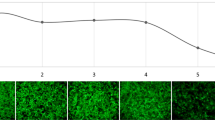Abstract
The development of nonviral vectors for in vivo gene delivery to hepatocytes is an interesting topic in view of their safety and tremendous gene therapy potential. Since cationic liposomes and liposome uptake by receptor-mediated mechanisms could offer advantages in the efficacy of liposome-mediated gene transfer, we studied the effect of liposome charge (anionic vs. cationic) and the covalently coupled asialofetuin ligand on the liposome surface in mediating human α1-antitrypsin (hAAT) gene transfer to mice in vivo. The changes in liposome charge were made by adding the following lipids to the backbone liposomes: anionic phosphatidylserine, cationic N-[1-(2,3-dioleoyloxy)propyl]-N,N,N-trimethylammonium methylsulfate or a lipopeptide synthesized from dipalmitoylphosphatidylethanolamine and covalently coupled to the cationic nuclear localization signal peptide. Two plasmids containing the hAAT gene were used: pTG7101, containing the complete genomic sequence of the human gene driven by the natural promoter, and p216, containing the human hAAT cDNA under the control of the CMV promoter. The results indicate that both untargeted anionic and cationic liposomes mediate plasma levels of hAAT that decline over time. However, asialofetuin liposomes increase the plasma levels of hAAT and can mediate long-term gene expression (>12 months) with stationary plasma levels of protein. Results from quantitative and qualitative reverse transcriptase polymerase chain reaction match those from protein plasma levels and confirm both the human origin of the message and the liver as source of the protein. The use of asialofetuin liposomes in hepatic gene therapy may both increase and prolong in vivo gene expression of hAAT and other clinically important genes.
Similar content being viewed by others
Author information
Authors and Affiliations
Additional information
Electronic Publication
Rights and permissions
About this article
Cite this article
Dasí, F., Benet, M., Crespo, J. et al. Asialofetuin liposome-mediated human α1-antitrypsin gene transfer in vivo results in stationary long-term gene expression. J Mol Med 79, 205–212 (2001). https://doi.org/10.1007/s001090000185
Received:
Accepted:
Published:
Issue Date:
DOI: https://doi.org/10.1007/s001090000185




